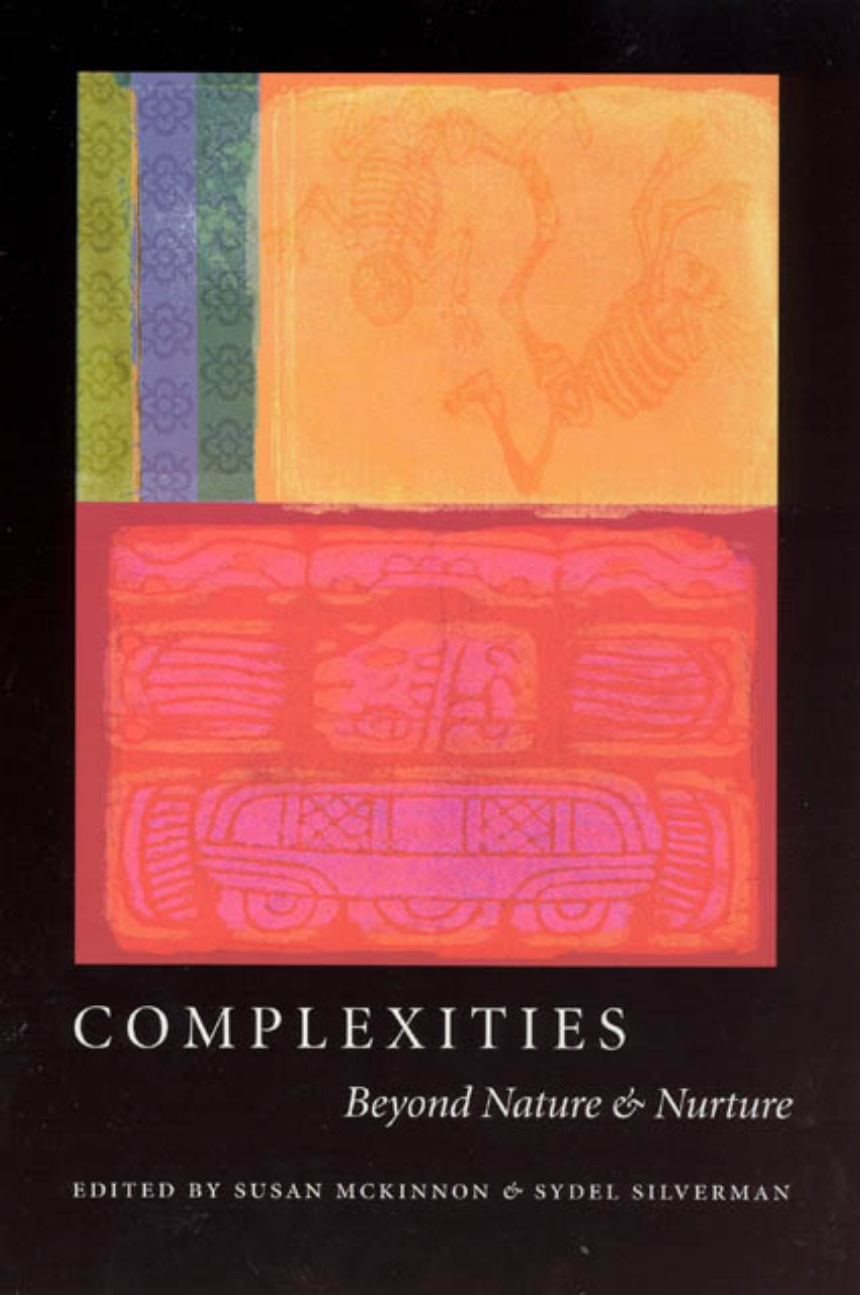Complexities
Beyond Nature and Nurture
Recent years have seen a growing impetus to explain social life almost exclusively in biological and mechanistic terms, and to dismiss cultural meaning and difference. Daily we read assertions that everything from disease to morality—not to mention the presumed characteristics of race, gender, and sexuality—can be explained by reference primarily to genetics and our evolutionary past.
Complexities mobilizes experts from several fields of anthropology—cultural , archaeological, linguistic, and biological—to offer a compelling challenge to the resurgence of reductive theories of human biological and social life. This book presents evidence to contest such theories and to provide a multifaceted account of the complexity and variability of the human condition. Charting a course that moves beyond any simple opposition between nature and nurture, Complexities argues that a nonreductive perspective has important implications for how we understand and develop human potential.
Complexities mobilizes experts from several fields of anthropology—cultural , archaeological, linguistic, and biological—to offer a compelling challenge to the resurgence of reductive theories of human biological and social life. This book presents evidence to contest such theories and to provide a multifaceted account of the complexity and variability of the human condition. Charting a course that moves beyond any simple opposition between nature and nurture, Complexities argues that a nonreductive perspective has important implications for how we understand and develop human potential.
296 pages | 5 halftones, 2 figures | 6 x 9 | © 2005
Anthropology: Cultural and Social Anthropology, Physical Anthropology
Biological Sciences: Behavioral Biology, Evolutionary Biology
Language and Linguistics: Anthropological/Sociological Aspects of Language
Psychology: Experimental, Comparative, and Physiological Psychology, General Psychology
Reviews
Table of Contents
Preface
Introduction
Susan McKinnon and Sydel Silverman
I. Challenging Reductive Theories of Mind
1. Epigenesis, Brain Plasticity, and Behavioral Versatility: Alternatives to Standard Evolutionary Psychology Models
Kathleen R. Gibson
2. Do Humans Have Innate Mental Structures? Some Arguments from Linguistics
William A. Foley
3. The Eye of the Beholder: How Linguistic Categorization Affects "Natural" Experience
Eve Danziger
II. The Limits of Universal Models
4. Reassessing Male Aggression and Dominance: The Evidence from Primatology
Katherine C. MacKinnon and Agustin Fuentes
5. On Kinship and Marriage: A Critique of the Genetic and Gender Calculus of Evolutionary Psychology
Susan McKinnon
6. Surveying a Cultural "Waistland": Some Biological Poetics and Politics of the Female Body
Mary Orgel, Jacqueline Urla, and Alan Swedlund
7. Denaturalizing Gender in Prehistory
Lynn Meskell
III. Putting Genes in Context
8. Context and Complexity in Human Biological Research
Thomas Leatherman and Alan Goodman
9. Alzheimer’s Disease: A Tangled Concept
Margaret Lock
10. The Molecular Revolution in Medicine: Promise, Reality, and Social Organization
Karen-Sue Taussig
IV. The Politics of Reductionism
11. Barbarism, Old and New: Denaturalizing the Rhetoric of Warfare
Mary H. Moran
12. Language Standardization and the Complexities of Communicative Practice
John J. Gumperz and Jenny Cook-Gomperz
13. Blood and Belonging: Long-Distance Nationalism and the World Beyond
Nina Glick Schiller
List of Contributors
Index
Introduction
Susan McKinnon and Sydel Silverman
I. Challenging Reductive Theories of Mind
1. Epigenesis, Brain Plasticity, and Behavioral Versatility: Alternatives to Standard Evolutionary Psychology Models
Kathleen R. Gibson
2. Do Humans Have Innate Mental Structures? Some Arguments from Linguistics
William A. Foley
3. The Eye of the Beholder: How Linguistic Categorization Affects "Natural" Experience
Eve Danziger
II. The Limits of Universal Models
4. Reassessing Male Aggression and Dominance: The Evidence from Primatology
Katherine C. MacKinnon and Agustin Fuentes
5. On Kinship and Marriage: A Critique of the Genetic and Gender Calculus of Evolutionary Psychology
Susan McKinnon
6. Surveying a Cultural "Waistland": Some Biological Poetics and Politics of the Female Body
Mary Orgel, Jacqueline Urla, and Alan Swedlund
7. Denaturalizing Gender in Prehistory
Lynn Meskell
III. Putting Genes in Context
8. Context and Complexity in Human Biological Research
Thomas Leatherman and Alan Goodman
9. Alzheimer’s Disease: A Tangled Concept
Margaret Lock
10. The Molecular Revolution in Medicine: Promise, Reality, and Social Organization
Karen-Sue Taussig
IV. The Politics of Reductionism
11. Barbarism, Old and New: Denaturalizing the Rhetoric of Warfare
Mary H. Moran
12. Language Standardization and the Complexities of Communicative Practice
John J. Gumperz and Jenny Cook-Gomperz
13. Blood and Belonging: Long-Distance Nationalism and the World Beyond
Nina Glick Schiller
List of Contributors
Index
